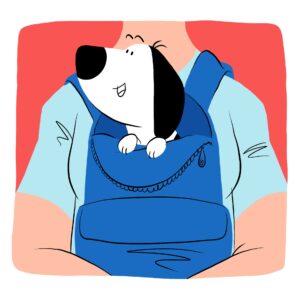Pets and Their People Blog
Why Focus on Life Skills vs Obedience in Dog Training?
Life skills training isn’t just a flashy buzzword; it’s the most up-to-date way of training dogs, where we focus on skills for life vs the traditional obedience commands of yesteryear.

The life skills approach emphasizes training dogs to be well-behaved and well-adjusted in everyday environments, rather than just focusing on obedience commands in a controlled training setting.
Life skills training focuses on teaching skills to dogs that are relevant to their day-to-day lives. It has been so long since dogs were domesticated, and even relatively modern life is very different from the routines and lifestyles we had with them twenty years ago, so training has had to change accordingly.
For some dogs, their lifestyle might mean they need different types of life skills – the city dog might need to know more about settling in café society, whereas the farm dog is unlikely to be going out regularly for puppuccinos.
The key is tailoring the training to your individual dog and what skills for life they require.
What are common life skills to teach dogs?
Common life skills to teach dogs will be things you use in everyday life for them to be a well-behaved dog in society.
- Making the right choices – Being able to choose the ‘better’ choice means you don’t have to cue your dog to do ‘the right thing’ – they have learned with environmental cues.
- Impulse control – teaching dogs to wait their turn, be patient, and resist the urge to jump on people, snatch food, or chase after squirrels.
- Being polite around people – teaching dogs not to jump up on people, bark excessively, or be too demanding!
- Settling in public – We like to take our dogs out and about, so teaching them to settle in different environments and public places is a common life skill to teach.
- Handling and grooming – training dogs to be comfortable being touched, handled, and groomed, as well as teaching them to be happy with routine veterinary care and grooming.
- Loose leash walking – We don’t need to use cues like ‘heel’ anymore; our dogs can understand that if the leash goes on, it’s time for them to walk in a relaxed way.
- Socialization – positively exposing your dog to new people, places, sights, sounds, and smells in a controlled, positive way. These pleasant experiences help make them more confident and less fearful.

All of this training should be taught with positive reinforcement. By rewarding dogs for making the right choices, they are more likely to make those good choices in the future.
What are the benefits of life skills training?
Life skills training gives us a ‘thinking dog’ who is more in control of themselves and their actions. Life skills trained dogs are able to make good choices, and can often generalize this concept to other areas of their lives.
For example, a ‘leave it’ cue is commonly used in traditional obedience training, and of course it’s a useful cue to have. With life skills training, it is aimed at teaching the dog to not try to get something, but to leave it alone and still receive rewards from other places. This skill requires a lot of self-control and is excellent for problem-solving!
Life skills style dog training aims to help dogs become well-rounded, socially adaptable, and well-behaved companions in various real-world situations, and is particularly good for dogs who live with families.
Try training your pup ‘the life skills way’ like we do in the Zigzag app, and you can build a strong and harmonious relationship AND have a wonderfully behaved dog too.
About the Author
Petrina Firth is a Dog Trainer and Certified Animal Behaviorist of over 10 years who now mainly specializes in Separation Anxiety (CSAT) and also creates content, lessons and articles for the Zigzag puppy training app and website. Petrina is a member of the Pet Professional Guild, the head of marketing and board member for the APDT UK, and a member of the CAPBT committee. She is also a tech and gadget enthusiast who enjoys city living with her rescue French Bulldog and partner.
Zigzag is a puppy training app with a difference, rather than focusing solely on obedience we take puppy guardians on a journey through Life Skills and important developmental stages, to hopefully give them happy, confident and well-behaved puppies, with an understanding that puppies and dogs aren’t robots, they have big feelings, and that’s ok!
Zigzag is a Pet Professional Guild corporate partner.

